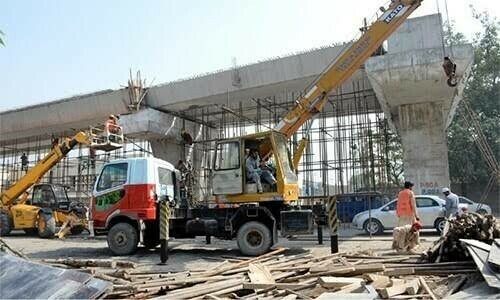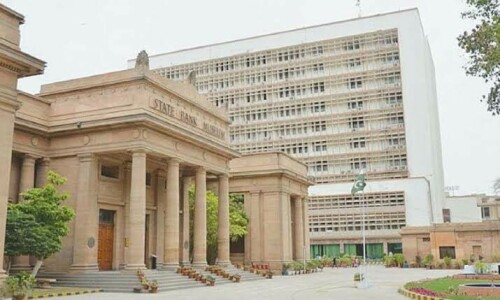
THE rates of di-ammonium phosphate (DAP) fertiliser have been reduced in the international market by 40 per cent. However, this benefit has not trickled down to the farmers in the country. The Punjab chief minister has announced the incentive-based wheat sowing policy to provide tractors and agri-machinery for the high-end sowers, but in the absence of easy availability of affordable fertiliser, there will be few making use of the incentive.
The farmers have valid reasons due to the previous year’s flawed wheat policy. They have either withdrawn the land contracts or have opted for alternative crops. Coupled with other problems, this depicts something that is rotten in the domain of agriculture.
The per-acre yield of crops has sign-ificantly dropped or lagged far behind in comparison to international yields. For example, the per-acre yield of wheat is roughly 30-35 maunds, but in other countries it goes as high as up to 160 maunds per acre. According to the Food and Agriculture Organisation (FAO) of the United Nations, the production of wheat in Pakistan stands at 27.8 million tonnes annually. This is an alarming situation that encourages black marketing and hoarding of wheat, and exploitation of the farmers.
Similarly, the rate set by the government for sugarcane at just Rs400 is too low to meet the financial gaps. How can one justify the maths of a one-and-a-half-year crop that takes a heavy investment and gets affected by the impact of climate change? How can it be sold at a rate even lower than the wood rate of over Rs600?
The farmers are sandwiched between the mill-owners’ mafia and government. Unfortunately, the subsidy is transferred to the mills and traders instead of the farmers. This pain is beyond imagination.
Kisan Cards are still unyielding due to the unavailability of subsidies to the farmers. The fertiliser traders are capi-talising again on the rates and plundering the poor farmers.
There should be options, like instant withdrawal of cash from these cards. The irregularities and discrimination in the distribution process are preventing the benefits from trickling down to the farmers.
The flawed wheat policy of the previous year has discouraged the farmers and now they are reluctant to sow the staple again. The set target of the Punjab government is 16.5 million acres and the ministers are pushing the farmers to meet the target. They may or may not succeed, but one thing is clear; the farmers have lost faith in the government. Against a rate of Rs7,800, DAP fertiliser is being sold at over Rs13,000. As fertiliser is vital for the wheat crop, its unavailability is a hallmark of sheer discrimination and prejudice against the farmers.
Furthermore, the citrus production in the country has hit record low due to multiple factors, especially climate change. Severe and prolonged heat, smog and late arrival of winter, coupled with inefficiency, have aggravated the situation. The lack of government interest in bringing in new varieties is also a problem because one variety lasts 25 years before it becomes susceptible to microbial attack. Similar lack of direction has also affected cotton production, which has been 33pc less this year.
The cost of agricultural machinery has also seen a sharp increase of up to 300pc. Agricultural input costs, including fertilisers and machinery, surged by 57pc, with farmers struggling to cope with the financial burden. Fertiliser prices alone have risen by 200pc between 2020 and 2022.
As things stand, there is a rather urgent need to initiate reforms in the agri-cultural sector. Moreover, the govern-ment must have a comprehensive approach to rebuild the farmers’ confidence.
Chaudhary Aamir Sohail
Sargodha
Published in Dawn, December 17th, 2024











































Dear visitor, the comments section is undergoing an overhaul and will return soon.